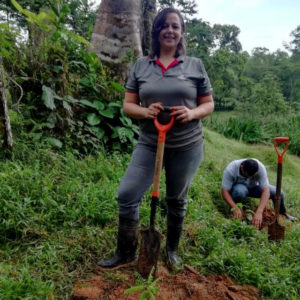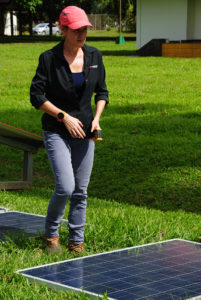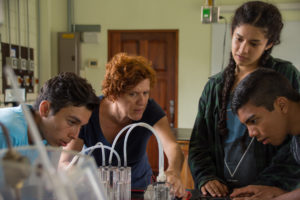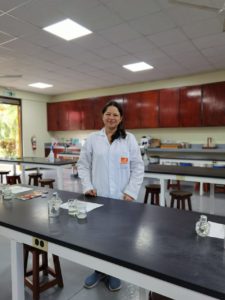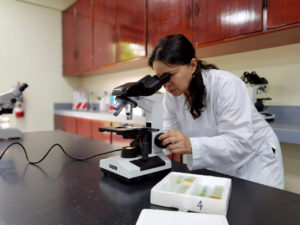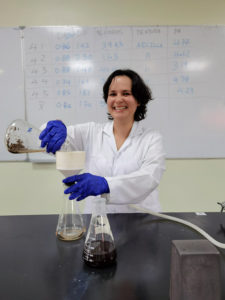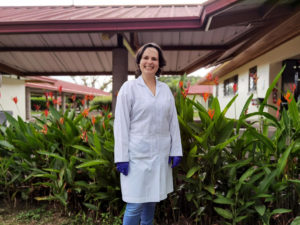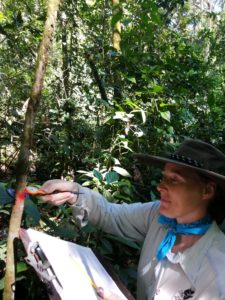Doing science: Insights from five women professors
Science expands humanity’s horizons. Uplifting women, especially in male-dominated fields like agriculture, expands those horizons even further.
For decades, EARTH University has strived to fill our classrooms, labs, and farms with an equal number of young men and young women from across the world, all of whom are studying how to improve rural communities’ social, economic, and environmental welfare. Additionally, we have endeavored to increase the percentage of women experts within our distinguished, international faculty of teachers and researchers.
The women professors at EARTH are role models, knowledge creators, and stigma breakers. We all benefit from their wisdom.
So, we asked them: What does it mean, to you, to “do science”?
Doing science is discovery
At a young age, Amanda Wendt (USA) fell in love with rainforests – their mysteries, their wildness, their vibrancy. During a second-year course in college, she visited tropical forests in Costa Rica, where she began recognizing the impacts of agricultural activities on diverse ecosystems and communities. From then onward, she dedicated herself to the study of interactions between wildlife, forests, and humans. Since completing her Ph.D. in Tropical Forest Regeneration & Ecology, she has led countless projects for academic institutions and corporations – including being the principal investigator of an NSF-funded initiative that fosters connections between underrepresented students and the natural sciences.
To Wendt, doing science means systematically generating new knowledge and learning how to properly apply it. Today, she helps EARTH students build and evaluate reliable, methods-driven research projects.
“I am fortunate to do science while listening to the sounds of monkeys and birds as they feast on the fruits of almond trees. My career is intense, allowing me to get muddy in the forest and be totally immersed in ecosystems. I share with others whatever I observe in the forest’s interactions, like when I spot some fruit on the ground that exhibits the marks of the rodents that ate from it. That action tells me about seed dispersal, about movement, about the place where the next generation of that plant species will be born. And that is doing science.”
—Amanda Wendt, Ph.D., professor of Graduation Projects and research
Doing science is magic
Mildred Linkimer (Costa Rica) was a curious child, always asking why things happened and trying to uncover the answer herself.
When Linkimer enrolled in college to study agronomy, there were only two young women in the program. That disproportionate dynamic presented a series of challenges to her, mainly the constant pressure to “prove” to professors that she was fully capable of keeping pace with her male classmates. Persevering through the sexism she encountered, she moved steadily forward on her professional path and completed a Ph.D. in Renewable Energies. She focused her efforts on analyzing humans’ effects on the planet and seeking ways to increase the beneficial ones. That is how she got invested in studying cleaner energy.
For more than 15 years, Linkimer has been teaching courses at EARTH about general physics and clean energy development in rural areas. She also co-directs the Center for Research and Development in Renewable Energies (CIDER), while conducting research into bioenergy with students and communities.
“Doing science is fostering curiosity, experimenting, and answering questions. It is trial and error as well as a continuous learning process that ensures we never stop growing. It is magic.”
—Mildred Linkimer, Ph.D., professor of physics and clean energy
Doing science is applied research
While an agricultural engineering student, Ana Cristina Tamayo (Colombia) worked for a cardamom company. Originally focused on agricultural management, one day she was asked to participate in a genetic-improvement project for the spice. Instantly fascinated, genetics would become her specialty. She earned a master’s degree in biotechnology and carved an important space for herself in an industry that was largely unwelcoming to women. But that was not the scariest part. The violent guerrillas and paramilitaries that terrorized Colombia for decades were active in the area where she worked. Following her passion – and simply doing her job – represented a daily act of courage.
Armed with a Ph.D. in Education, Tamayo decided to travel to Costa Rica to teach at EARTH, in 2002, and lead research projects about molecular biology. She continues to be involved in cardamom-export research in India and Colombia.
“To me, doing science can mean being in the lab making compounds or investigating molecular processes and also being in the field, experimenting with a producer and applying research methods. I don’t see one without the other. Science is applied research.”
—Ana Cristina Tamayo, Ph.D., professor of applied genetics
Doing science is helping others
As a teenager at a STEM high school, Paola Chavarría (Costa Rica) saw how science had the power to answer everyday questions and find solutions to many of the world’s pressing problems. She fell in love with science’s systematic structure and how experimentation yielded new learning for herself. During her bachelor’s, she majored in chemistry; during her master’s, she zeroed in on agricultural chemistry.
Chavarría regarded food manufacturing as an industry in which chemistry could be applied to benefit the public. Enforcing science-based quality-control measures within food production could prevent or reduce the risk of contamination and illness – in humans and wildlife. At EARTH, she teaches courses in organic and inorganic chemistry as well as biochemistry and continues leading research related to analytical methods, product formulation, and chemical interactions.
“Doing science is about finding answers and solving real problems. Sometimes it seems that science is distant from daily life, but we live it every day in everything we do.”
—Paola Chavarría, M.Sc., professor of chemistry
Doing science is experimentation
When Alex Gilman (England) was finishing high school, she felt unready to start university – and instead desired to see the world. She worked as a secretary for four years, ultimately saving enough money to backpack across continents. Wanting to travel in a conscious way, she learned about other cultures and discovered the wonders of nature far away from her home. As she moved through different countries and grew as a global citizen, she became more and more interested in understanding how different landscapes were formed. After an enlightening two-year journey, she decided to study physical geography and geology.
Gilman’s nomadism did not end, however. Seeking to never again toil in an office, she studied the rainforest in Bolivia, pursued a Ph.D. in Biology at the University of California, and joined projects in South Africa, Chile, and Costa Rica, where she came to work on her dissertation. She ended up staying in Costa Rica, to teach applied ecology at EARTH and conduct research into ecosystem health and tropical forest restoration.
“The great thing about doing science is that you always get to be creative, to detect knowledge gaps, and to generate new projects that advance the world. To me, doing science is throwing myself on the ground with a ton of equipment, studying something from every angle, devising a procedure, and looking for new ways to reach a result. Science is experimenting, like we have done at EARTH with the educational model.”
—Alex Gilman, Ph.D., professor of applied ecology

